Hyundai to bring Casper EV to Japan, premium Genesis cars to India
With the electric Casper, Hyundai aims to revitalize its stagnant sales in Japan while pursuing a new Southeast Asian strategy
By Mar 14, 2024 (Gmt+09:00)
LG Chem to sell water filter business to Glenwood PE for $692 million


KT&G eyes overseas M&A after rejecting activist fund's offer


Kyobo Life poised to buy Japan’s SBI Group-owned savings bank


StockX in merger talks with Naver’s online reseller Kream


Meritz backs half of ex-manager’s $210 mn hedge fund


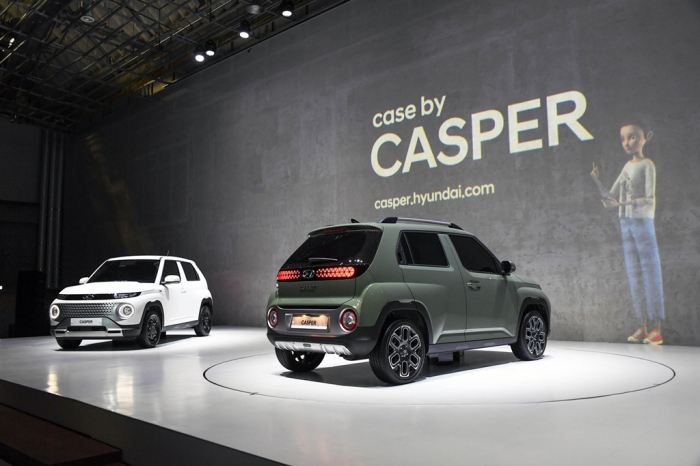
Hyundai Motor Co. will bring its electric Casper crossover city car to Japan next year as part of a bid to reinvigorate its performance in the neighboring country.
The top South Korean automaker also plans to roll out its high-end premium line of Genesis cars in India, the world’s third-largest car market after China and the US and among the fastest-growing electric vehicle markets in Asia.
Hyundai is set to build an electric version of the Casper, a mini sport utility vehicle, at its Gwangju Global Motors (GGM) plant in Korea in the second half of this year and sell the model in Japan from early next year, people familiar with the matter said on Thursday.
With the electric Casper, Hyundai will be selling three EV models in Japan, including the IONIQ 5 crossover and the Kona Electric, which are already available in the market.
“The IONIQ 5, praised globally for its competitive price and performance, may not be perfect for Japanese consumers given their relatively small garages for compact Japanese vehicles,” said one of the sources.

The Casper EVs will come in two models – one with a 300 km range on a single charge and the other that can run up to 400 km.
The compact electric cars will be price competitive as they are equipped with relatively cheap lithium iron phosphate (LFP) battery cells. Prices of the Hyundai Casper EVs to be sold in Japan will be set at the same levels as in Korea, sources said.
OFFLINE MARKETING CONSIDERED TO JACK UP SALES
In 2022, the Korean automaker said it is re-entering the Japanese car market after a 12-year hiatus, starting with the IONIQ 5 and the NEXO, a hydrogen fuel cell SUV.
Hyundai made inroads into Japan in 2001 but gave up its passenger car business in 2009 due to weak sales there.
Its ambitious plan to revitalize its sales in Japan, however, didn’t take off partly due to its sales strategy to only sell vehicles through online platforms to appeal to buyers accustomed to online shopping in the pandemic era.
Over the past couple of years, Hyundai sold 495 vehicles in Japan. Chinese EV maker BYD Co., which entered the market in 2022, has so far sold 1,511 units.
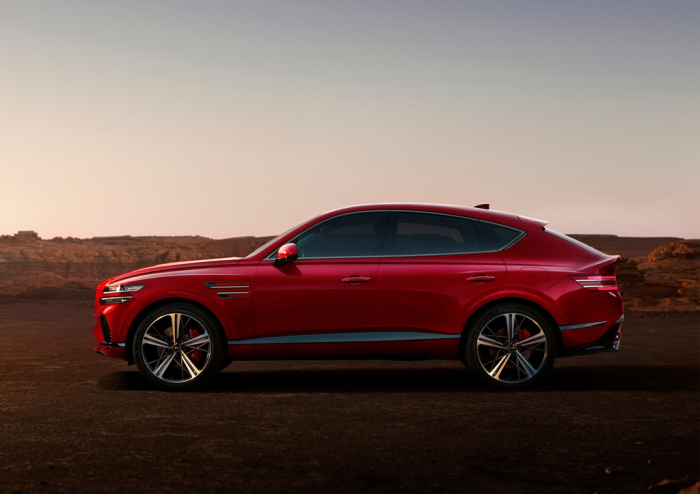
Industry sources said this time Hyundai plans to sell the Casper EV and other vehicles through dealerships as well as its online platforms.
China’s BYD has recruited a large number of local dealers – a strategy that contributed to its higher EV sales than Hyundai there, industry officials said.
LUXURY GENESIS CARS IN INDIA
Hyundai Motor, together with its affiliate Kia Corp., is the world’s third-largest automaker thanks to brisk sales in advanced markets such as the US and Europe.
The Korean duo has been striving for years to crack the Japan-dominated Southeast Asian market with their EV models.
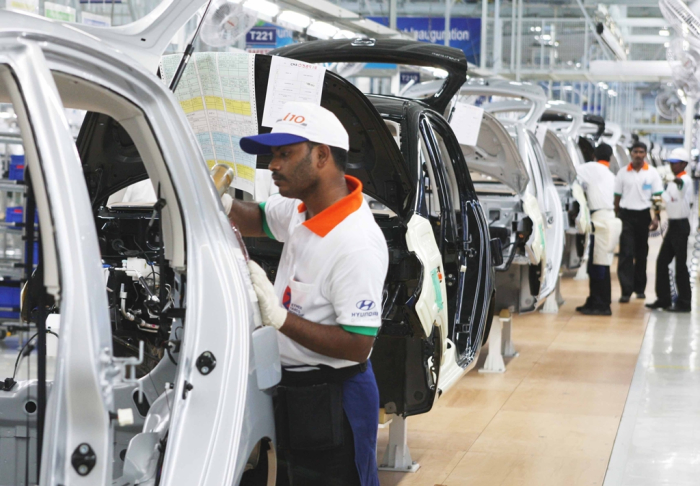
As part of such efforts, Hyundai plans to bring premium models under its standalone Genesis brand to India, where the Korean automaker is already doing well with compact SUVs such as the i10, i20 and the Creta.
“We believe it is important to launch the Genesis brand in India to cement our position there,” said a Hyundai official. “We haven’t made the final decision on the launch, but expect to conclude it soon.”
India is the world’s most populous country with 1.43 billion people with its economy growing over 7% annually over the past three years.
Hyundai operates a plant in Tamil Nadu’s capital city of Chennai, dubbed the Detroit of Asia, with an annual production capacity of 820,000 vehicles.
Combined with Kia, Hyundai is the No. 2 carmaker in India, controlling a fifth of the market, only behind top carmaker Maruti Suzuki India, the local unit of Japan’s Suzuki Motor.
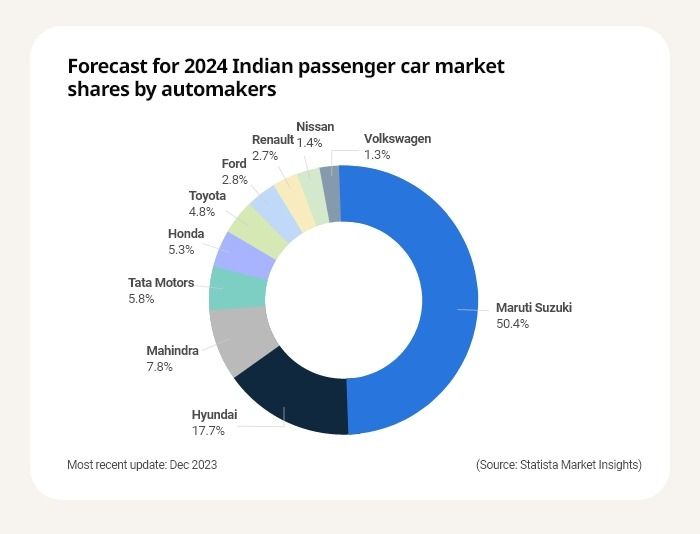
Last year, Hyundai acquired a car manufacturing plant with an annual production capacity of 130,000 cars in Talegaon, Maharashtra from General Motors Co.
Once the new EV plant is up and running next year, Hyundai’s total production volume in India is expected to rise to nearly 1 million units.
In January, the Korean carmaker said it would invest 70 billion Indian rupees ($845 million) to expand and upgrade its Talegaon plant.
KIA TO BUILD A NEW PLANT IN THAILAND
Kia, which opened a plant in India in 2019, produces the Sonet and Seltos crossover SUVs as well as the Carens and the Carnival minivans in the country.
As part of its efforts to expand its presence in the Southeast Asian market, the company plans to build a new factory with an annual capacity of 250,000 units in Thailand.
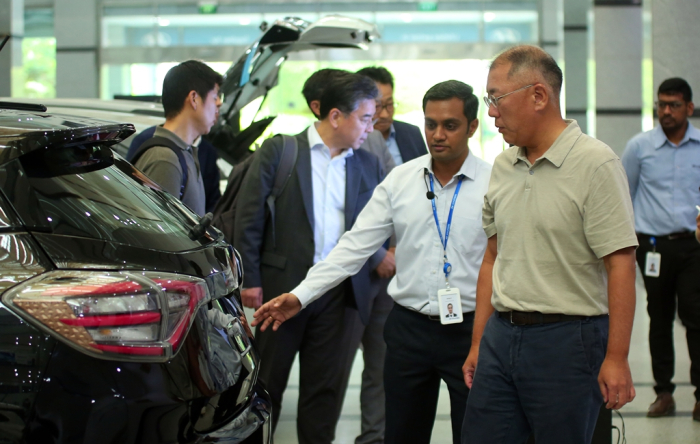
The Thai government has set a goal that 30% of the vehicles produced in the country will be electric models by 2030.
Currently, China's BYD is the top EV seller in Thailand. Tesla Inc. has said it would build an EV plant in the country.
Last year, Hyundai and Kia's combined sales volume in the Asia-Pacific region, including Southeast Asia, Australia and New Zealand, was 380,000 units, accounting for only 5% of the duo’s total global sales of 7.44 million units.
Hyundai Motor Group’s focus on the Southeast Asian market is projected to make up for its heavy losses in China and Russia.
Hyundai’s performance in the Chinese market has deteriorated since 2017 when China's retaliation against the Korean government’s establishment of the Terminal High Altitude Area Defense (THAAD) anti-missile system in Korea.
Hyundai and Kia’s Chinese market share in 2023 stood at 1.4%, their lowest ever.
Kia plans to launch EV models dedicated to the Chinese market such as the EV5 and the large flagship EV9 to improve its sales performance there.
Write to Jae-Fu Kim at hu@hankyung.com
In-Soo Nam edited this article.
-
 AutomobilesHyundai Motor to invest $845 million to expand India’s Talegaon plant
AutomobilesHyundai Motor to invest $845 million to expand India’s Talegaon plantJan 15, 2024 (Gmt+09:00)
3 Min read -
 AutomobilesHyundai to hike Exter SUV output to capitalize on void in India
AutomobilesHyundai to hike Exter SUV output to capitalize on void in IndiaOct 09, 2023 (Gmt+09:00)
3 Min read -
 AutomobilesHyundai Motor clinches top spot in Indian dealer satisfaction study
AutomobilesHyundai Motor clinches top spot in Indian dealer satisfaction studySep 26, 2023 (Gmt+09:00)
2 Min read -
 AutomobilesHyundai Motor’s Genesis: Distilled luxury with 1 million car sales
AutomobilesHyundai Motor’s Genesis: Distilled luxury with 1 million car salesSep 17, 2023 (Gmt+09:00)
3 Min read -
 AutomobilesHyundai Motor's Genesis delivers Korean luxury to Europe
AutomobilesHyundai Motor's Genesis delivers Korean luxury to EuropeJun 19, 2023 (Gmt+09:00)
2 Min read -
 AutomobilesHyundai, Kia vow to crack Japan-dominated SE Asian market with EVs
AutomobilesHyundai, Kia vow to crack Japan-dominated SE Asian market with EVsJan 21, 2023 (Gmt+09:00)
4 Min read -
 AutomobilesHyundai to take fresh crack at Japan market with online EV sales
AutomobilesHyundai to take fresh crack at Japan market with online EV salesFeb 08, 2022 (Gmt+09:00)
3 Min read


